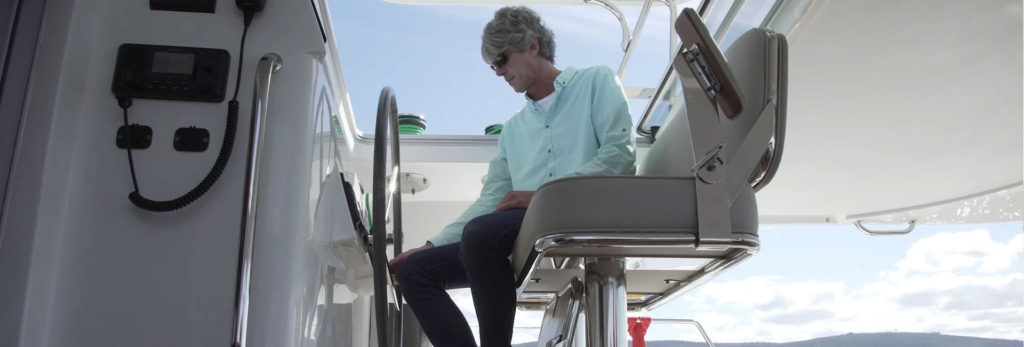Buying your very own semi-custom yacht is a big step – and a major financial investment.
After securing the necessary financing and sealing the deal, you’ll work closely with your yacht builder throughout your boat’s design and construction process to create a yacht that’s a reflection of your unique style and personality.
Once your boat’s construction is underway, you will need to consider how best to protect your investment.
Unfortunately, boating accidents (potentially resulting in yacht damage and passenger injury) are realities to take into account and provide for. You’ll want to ensure that, in the event of any accident or natural disaster, both you and your boat are protected.
Depending upon the level of coverage you select, boat insurance will cover both you and your yacht against damage as well as liability, protecting you from significant potential financial loss.
Read on for all the essential information you’ll need when it comes to selecting boat insurance for your yacht.
#1 Why Do I Need Boat Insurance?
Semi-custom yachts are costly, luxury items that need adequate protection in the form of boat insurance.
Imagine for a moment that your yacht sunk, was stolen or severely damaged. Without having a policy in place to cover this precious asset, you will be hundreds of thousands of dollars out of pocket. It is no exaggeration to state that having yacht insurance can mean the difference between complete peace of mind – and financial ruin.
Yacht insurance provides indemnity liability coverage for sailing vessels. Simply put, it means that boat owners will be covered in the event of their boat causing damage to another person’s property, bodily injury sustained by passengers, and damages to any personal property aboard the insured vessel.
Some additional add-on coverage options that you can select for your boat insurance policy include:
- On-water towing
- Roadside assistance
- Coverage for personal property and/or fishing equipment
- Hurricane haul-out
- Mechanical breakdown
#2 Don’t Assume Your Home Insurance Will Cover Your Boat On the Water
Some yacht owners assume that they don’t need boat insurance because their homeowner’s insurance policy will cover any damages to their boat. Your home insurance policy may cover your boat while it’s stored on your property, but your boat will not be covered when it’s out on the water.
Additionally, when it comes to your homeowners’ insurance policy, there are limitations to the value and size of a boat that can be included in it. Most of the time, the boat’s value cannot be above a few thousand dollars. This type of insurance coverage typically applies to small boats, kayaks, or canoes, but does not cover semi-custom yachts.
#3 When Should I Take Out Boat Insurance?
If you’re financing the purchase of your semi-custom yacht, you will likely be required to show proof of boat insurance as part of the financing process. Your policy will need to cover the entire value of your yacht. The financing company you’re working with may also have minimum requirements for the amounts and type of coverage you can take out on your yacht.
Additionally, some marinas and ports might require you to have boat insurance before you will be allowed use of their facilities. Depending upon the marina, you might even have to list them as an “additional interest” or “additional insured” on your boat insurance policy. When you go to sign a contract for a mooring or a slip, you will need to show proof of your yacht’s insurance.
With that in mind, you should definitely investigate obtaining insurance for your boat as part of the purchase agreement when buying your yacht from your yacht builder. You don’t want to be rushing around at the last minute trying to get an insurance quote and policy locked in. Being prepared and covering all your bases – including boat insurance – is vital during the yacht-buying process.
#4 What’s Included in Boat Insurance?
It’s important to learn how to insure a yacht and what you should expect from your policy before you commit to an insurance company. When insuring your boat, you can choose between two types of policies:
- Actual Cash Value: All property losses that are covered are subject to depreciation in value
- Agreed Value: In the event of an accident, you’re paid an agreed-upon value of the yacht by your insurance company
While an actual cash-value policy premium costs less than an agreed-value one, your payout will also be of a lesser value. Most insurance companies recommend going with an agreed value policy, as this will ensure that such-insured yacht owners receive a maximum payout.
The average boat insurance policy will cover:
- Damage to any part of your boat, including its furnishings and trailer
- Medical payments
- New boat replacement
- Wreck removal and salvage coverage
- Uninsured boater protection
- Damages caused to another boat
- Damages to other types of property
There are two major components to any boat insurance policy that you should educate yourself about.
Hull Insurance
Hull insurance encompasses direct damage and all-risk coverage. It includes an agreed-upon amount that’s decided on when the insurance policy is written. In the event of damage or an accident, if the yacht is considered a total loss, the agreed-upon amount will be paid out to you in full.
Hull insurance also includes replacement cost coverage for any partial losses. However, it doesn’t include items such as:
- Sails
- Batteries
- Outboards
- Canvase
Instead, these items are subject to depreciation in value and are paid out accordingly.
Protection and Indemnity (P&I)
P&I is very broad liability coverage. Maritime law is very complex and particular, meaning your boat will require coverage that was accordingly and specifically designed. Harbour workers’ and longshore coverage as well as Jones Act coverage, for your yacht crew, are included in P&I coverage.
The above-mentioned coverages are important because your losses could sometimes run into the six figures. P&I coverage will protect you against any judgments and it will pay for your defence costs in admiralty courts.
Deductible Amounts
With a yacht insurance policy, the deductible is typically a percentage of the insured value. If you have a 1% deductible on a yacht that’s valued at $150,000, the deductible would be $1,500. The average insurance company usually has 2% as their maximum deductible amount.
Below are some standard deductibles and limits included in yacht insurance policies:
- $10,000 limit for medical payments
- $500,000 limit for personal effects, with a $250 deductible
- $1,000 – 3,000 for limited towing and assistance, with no deductible
- $500,000 limit for uninsured boaters’ liability, with no deductible
- $1,000 for hurricane haul-out coverage with a small percentage of the limit being the deductible
If you want to increase the limits in certain areas on your boat insurance policy, speak to your insurance broker when they’re writing up the policy. Keep in mind that doing so will affect your total premium cost.
What Does it Cost to Insure a Yacht?
Determining boat insurance pricing is another key factor when selecting the right policy for you. There are different factors that will influence how much your policy costs. These factors include:
- How you’ll store your boat
- In what ways you’ll use your yacht and how often
- The size of your semi-custom yacht
- The model or type of yacht
- The type and amount of coverage you require
The average yacht insurance policy costs around 1.5% of your yacht’s value. If your yacht costs around $150,000, you can expect to pay around $2,250 for your insurance policy. The more expensive the yacht, the higher the policy will be.
You can also get discounts on your boat insurance premium by taking a course in boating safety, having a boater education license, keeping your boat in a specific geographic area, or having a positive driving record.
The above calculation is to give you a frame of reference for evaluating how much a policy will cost before you contact an insurance agent. As we mentioned above, there are other factors that will either lower or increase the policy amount.
When looking for a boat insurance policy, it will be worth your while to shop around for the best coverage. Most auto and home insurance companies offer boat insurance, but they may refer to it as “personal watercraft insurance”. You might also get a policy discount if you select an insurance provider where you already have another existing policy.
Best Practices for Yacht Safety
Accidents are a reality of life. While many boating accidents occur each year, operating your vessel in a safe manner (and ensuring you’re adequately educated on boating safety) is essential to avoiding accidents as far as possible.
Going too fast, being careless or reckless on the water, and not following boating regulations can all result in yachting accidents.
However, there are measures you can take to up your chances of going through each year’s claims and accidents free.
You should ensure your yacht is properly equipped with navigation lights and a horn, bell, or whistle. Make sure there are enough life jackets available for everyone on the boat. You’ll also want a first aid kit and emergency safety devices, like radio and flares on board.
Before you head out on your yacht, remember to check the weather forecast. Make sure the weather will be good to ensure an easy boating experience. Let other people know when you’re coming back and where you’re heading to. Ensure you have adequate fuel to last the entire journey.
Know and Obey Local Maritime Laws
Know the local maritime laws and be sure to obey them to avoid trouble with authorities. Educate yourself on boating signals, especially ones that signal distress.
If you’re traveling through shallow waters, keep an eye out for other yachts, floating debris, rocks, and swimmers. If you’re under the influence of alcohol, don’t operate the boat – and don’t allow anyone else who has consumed alcohol to operate it either.
While there will always be factors that are out of your control, you should do everything in your power to ensure you operate your yacht as safely as possible. Having a comprehensive boat insurance policy will offer you peace of mind the next time you take your boat out on the water.
#5 Protect Yourself, Your Boat, and Your Passengers with Boat Insurance
Just as you protect your home and car with insurance, you need to provide insurance coverage for your semi-custom yacht and your passengers. You don’t want to end up in an unfortunate situation where you or your passengers are unprotected and at risk of major personal or financial loss.
You’d be wise to explore all your options and educate yourself on the ins and outs of boat Insurance before you purchase just any boat insurance policy.
#6 Boat Insurance. Complex – But Necessary
Boat Insurance. Complex – But Necessary
We hope this article has shed some light on the rather complicated (but very important) topic of boat insurance.
If you’re ready to embark on the journey of designing and owning your very own semi-custom yacht, or if you have any other questions about the yacht-buying process, contact us today.






